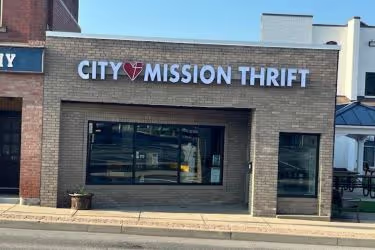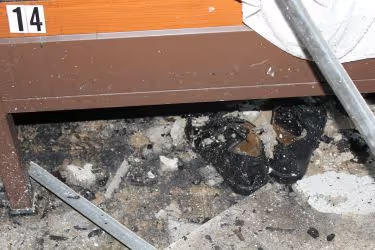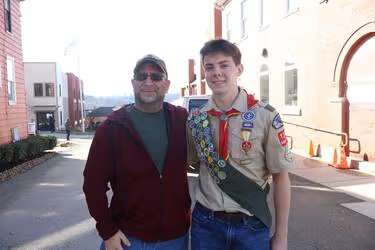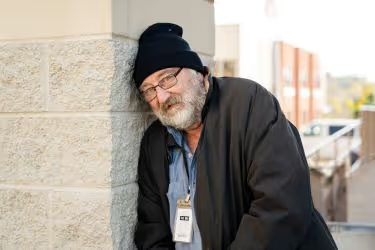HEIRS Model: Empowering Transformation through Holistic Care
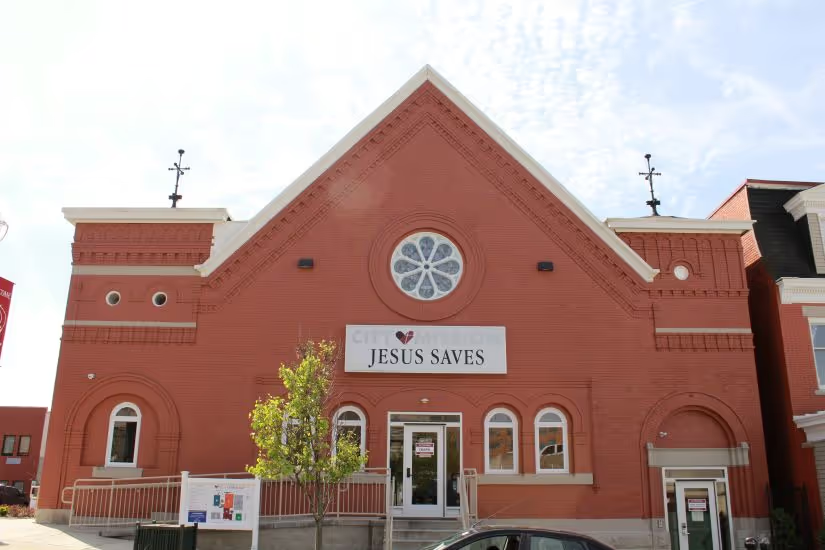
In a previous blog post, we provided an overview of the HEIRS model's history and background. In this article, we shift our focus to the unique aspects of the HEIRS components, highlighting their critical role in addressing the diverse needs of individuals experiencing homelessness. By examining each element in detail, we aim to provide a comprehensive understanding of how the HEIRS model guides our programs and fosters lasting change.
The Significance of the HEIRS Model:
What sets City Mission apart is our unwavering commitment to achieving tangible results for those who turn to us for help. While we recognize the importance of providing immediate necessities like housing and meals, which are often the first steps to life-transformation, our focus extends beyond these essential services. The HEIRS Model allows us to measure outcomes, track progress, and continuously improve our programs. By prioritizing results, we can effectively break the cycle of homelessness and empower individuals to lead fulfilling lives.
Upon intake, we evaluate each of our residents according to the five areas of the HEIRS model, which are explained in detail below. Based on that initial evaluation, we create an individualized plan for each resident and connect them to services designed to address each need. Then, we re-evaluate them every 90 days and track their progress, helping them become successful in each area of their lives and giving them the confidence to create a better life.
Housing: Stable Shelter as a Foundation
The "H" in the HEIRS model represents "Housing." Housing is a fundamental component of our approach to addressing homelessness and is recognized as a critical step towards stability and independence.
Within the HEIRS model, the focus on housing goes beyond providing a temporary shelter. City Mission is dedicated to connecting residents to safe, stable, and supportive housing options that empower individuals to rebuild their lives. The goal is to create an environment where people can thrive and make progress towards their personal and professional goals.
At City Mission, we provide safe, secure housing for our residents while they are with us, so they have the opportunity to focus on their own recovery without worrying about where they will sleep or where their next meal will come from. As they stabilize in all areas of their life, we begin to help connect them to permanent housing: whether that means helping them navigate the process of applying for subsidized housing or gaining employment and saving up for their own place, we help to guide them into the housing situation that best matches their life goals.
By addressing the immediate need for housing and providing ongoing support, City Mission aims to break the cycle of homelessness and equip individuals with the tools and resources they need to achieve long-term stability.
Employment: Building Pathways to Sustainable Work
Employment is a key element in breaking the cycle of homelessness, as it provides individuals with the opportunity to gain a stable income, improve their financial situation, and regain their independence. We believe that sustainable employment is instrumental in fostering long-term stability and self-sufficiency for the individuals and families we serve.
Our approach to employment within the HEIRS model is comprehensive, encompassing a range of initiatives and services designed to equip individuals with the skills, knowledge, and support they need to succeed in the job market.
Through our Career Training and Education Center, we ensure that individuals are equipped with essential skills and prepared to confidently enter the workforce. These programs cover a variety of topics, including resume writing, interview techniques, workplace etiquette, and job search strategies. By providing tailored workshops and individualized coaching, we empower individuals to navigate the job market with confidence and competence.
To improve employability, we offer online courses and career-enhancing certifications through our local library as well as hands-on vocational skills development programs that focus on honing specific job-related skills. Participants have the opportunity to receive job training within all aspects of our organization that best match their work aspirations or previous work experience. Residents can gain valuable job skills in food services, office administration, warehouse work, janitorial, and other fields. Our goal is to align training opportunities with local employment needs and individual interests, ensuring that individuals are equipped with in-demand skills.
We firmly believe that by addressing the employment needs of individuals experiencing homelessness, we can empower them to break free from the cycle of poverty, regain their self-sufficiency, and thrive in their communities.
Income: Financial Stability for Long-Term Success
The "I" in our HEIRS model stands for "Income," reflecting our recognition of the critical role that financial stability and income play in helping individuals rebuild their lives. We are dedicated to helping people secure and manage sustainable income that supports their journey toward independence and long-term stability.
Income is more than just a paycheck—it represents the means by which individuals can meet their basic needs, afford housing, access healthcare, and support themselves and their families. Our focus on the "Income" component within the HEIRS model aims to empower individuals with the knowledge, skills, and resources necessary to achieve financial well-being and break free from the cycle of poverty.
We assist residents in applying for public assistance benefits, veterans benefits, or disability benefits as appropriate for those who need it. A crucial first step for many of our residents in this process is obtaining identification credentials or replacing them if they have been lost. Acquiring a valid drivers' license, social security card, or birth certificate is a difficult by vital first step, and we have developed a program to walk our residents seamlessly through the process.
We also provide financial literacy and money management programs that equip individuals with the tools to make informed financial decisions. Our workshops cover topics such as budgeting, saving, debt management, and financial planning. By fostering financial literacy, we empower individuals to develop healthy financial habits, set realistic goals, and effectively manage their income to meet their needs both now and in the future.
Recovery: Overcoming Drug and Alcohol Addiction, Medical Barriers, and Mental Health Issues
The "R" in our HEIRS model stands for "Recovery," a vital element in our holistic approach at City Mission. We recognize that people experiencing homelessness often face significant obstacles in the form of medical barriers, mental health issues, and drug and alcohol addiction, hindering their path to independence. Consequently, we are dedicated to addressing these challenges head-on and providing unwavering support to individuals on their journey toward recovery.
Upon entering our program, individuals undergo a thorough assessment to evaluate their specific needs and identify any barriers related to mental health or drug and alcohol addiction. We offer an array of services, both on our campus and in collaboration with external treatment providers, to address these challenges effectively. Our primary objective is to connect individuals with the appropriate resources and treatment modalities, enabling them to overcome addiction or mental health barriers and establish a solid foundation for sustained recovery.
While on our campus, individuals have access to a variety of support mechanisms, including group sessions, educational classes, and participation in 12-step recovery programs. We believe that recovery can take many forms, and our approach aims to provide individuals with diverse avenues to address their addiction and regain control of their lives.
Upon intake, residents also receive a medical screening at our Medical Clinic. From that point, as needed, we help them acquire medical insurance, schedule medical appointments, find transportation to appointments, manage medications, and gain access to a primary care provider through our partnership with Centerville Clinics.
For those who struggle with homelessness, these barriers can often be overwhelming if they try to overcome them alone. Surrounding them with love and support can revitalize their confidence in these areas and lead to life-changing breakthroughs in their recovery.
Spirituality: Nurturing the Inner Journey
Spirituality is a cornerstone of the HEIRS model at City Mission, recognizing the profound impact it has on an individual's journey to recovery and overall well-being. We acknowledge that spirituality is a deeply personal and unique aspect of each person's life, encompassing beliefs, values, and the search for meaning and purpose.
The spiritual component of the HEIRS model encourages individuals to commit their lives to Christ, connect with their Heavenly Father, seek spiritual guidance in their walk of faith, and discover sources of inspiration and strength. It offers an opportunity for self-reflection, introspection, and the exploration of values that can guide individuals towards a more fulfilling and purposeful life.
Within our Christ-centered program, individuals have the opportunity to build a life-saving relationship with Jesus Christ and to engage in activities that nurture their spiritual well-being. These may include chapel services, Bible studies, group devotionals, prayer groups, spiritual counseling, mindfulness practices, or participation in faith-based programs. We also foster an atmosphere of acceptance, respect, and non-judgment, allowing individuals to freely express and explore their spiritual beliefs without fear of prejudice or exclusion.
Measuring Success with the HEIRS Model:
City Mission is committed to delivering measurable results through the HEIRS Model. We track success by monitoring housing stability, employment retention, income growth, recovery milestones, and spiritual development. This data-driven approach enables us to evaluate the effectiveness of our programs, make informed adjustments, and ensure that individuals receive the support they need for long-term success.
Our HEIRS Model is a testament to our dedication to transforming the lives of homeless individuals. By addressing the components of Housing, Employment, Income, Recovery, and Spirituality, we offer a holistic approach that empowers individuals to overcome barriers and achieve lasting independence.
Your support can make a life-changing difference for individuals on their journey to recovery and independence. By donating to City Mission, you can directly contribute to the success of our residents and help transform lives.


